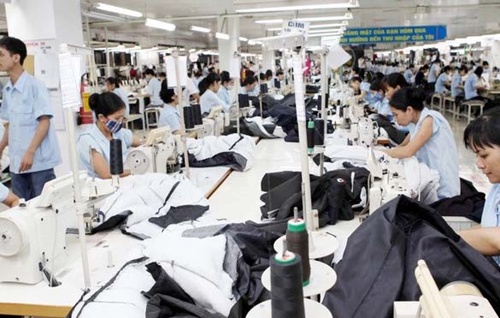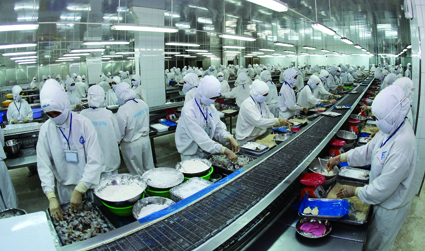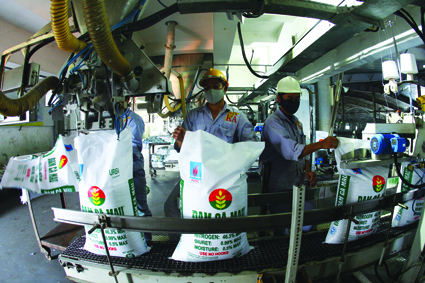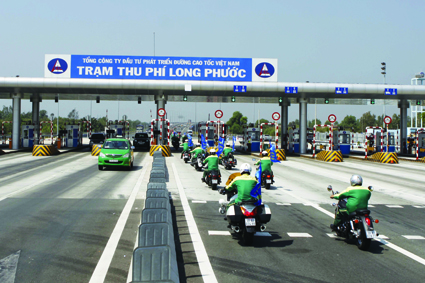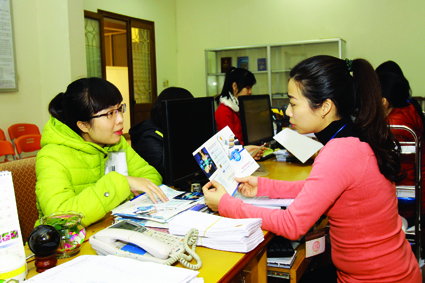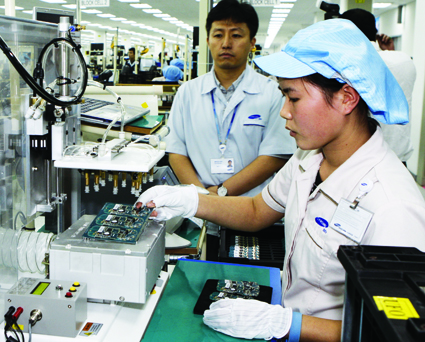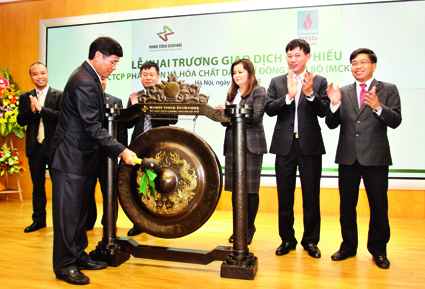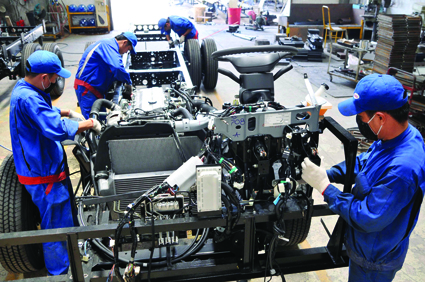* Enterprises are required to notify reasons for business suspension
The Ministry of Finance is considering changes in regulations on tax registration under the 2014 Law on Enterprises.
Accordingly, enterprise identification numbers will be granted automatically through the tax registration and administration system within 24 hours after receiving a complete and valid dossier from the business registry office.
If wishing to suspend their business operation, business establishments that are established and operating under the Law on Enterprises have to submit their dossiers for business suspension to the tax agency while those that are not established under the Law on Enterprises have to notify in writing the tax agency within 15 days before the planned suspension or resumption of their business operation.
Such a notice must clearly state the planned time of business suspension and resumption, and reasons for the business suspension.-
* New policy moves in favor of enterprises pledged
The ministers gave promisory answers to queries about the reform of policies and laws on enterprises at the mid-term Vietnam Business Forum 2015 on June 9.
Minister of Science and Technology Nguyen Quan affirmed that there would be documents to settle investors’ concern about the import of second-hand machinery.
If a foreign direct investment (FDI) project was approved, the imported machinery for the project would not require appraisal, Quan said. However, he noted, if the imported machinery was not used for the project, the machinery must be less than 10 years old or maintain at least 70 percent of their original quality.
If investors commit to assuring the quality of second-hand machinery, their machinery will be cleared from customs procedures and appraised after the machinery installation is completed. The investors will pay all expenses if they fail to fulfill their commitments.
For a specialized field, ministries and sectors may issue specific regulations instead of strictly applying prescribed standards to all types of machinery, the minister said.
Regarding foreign investors’ worry about two different procedures that must be carried out for grant of investment certificates and business registration, Minister of Planning and Investment Bui Quang Vinh said a foreign investor must have an investment project in Vietnam to establish a business like in other countries. However, under the Government’s new draft decree, the time limit for granting an investment certificate will be shortened from current 45 days to 15 days, and within two days after receiving the investment certificate, the business registry office will complete business registration procedures for the investor.
For her part, Minister of Labor, War Invalids and Social Affairs Pham Thi Hai Chuyen pledged to revise regulations under which foreigners working in Vietnam for a few days are required to ask for work permit and obtain copies of their judicial records both in the country of origin and Vietnam.
Minister of Finance Dinh Tien Dung confirmed that duty arrears would not be collected on commodity items that had previously enjoyed tax exemption but recently became liable to duties due to changes in preferential import-export tariff.-
* Is Vietnam waiving the right to domestic production protection?
Though there aren’t many tools left to protect domestic production because of commitments to the World Trade Organization (WTO) and free trade agreements (FTAs), it seems that the country still fails to effectively utilize the remaining tools, said participants to a workshop on June 1 in Ho Chi Minh City.
At the workshop entitled “Policy space supports economies - what are left behind FTAs?” jointly organized by the Vietnam Chamber of Commerce and Industry (VCCI) and non-governmental organization ActionAid, a number of scholars said tax tools and subsidy policies supporting the domestic production have not been effectively utilized.
According to Nguyen Thi Thu Trang, director of the VCCI’s WTO Center, Vietnam has made various commitments to join the WTO, is implementing eight FTAs and has recently signed two FTAs with the Republic of Korea and the Eurasia Economic Union. Such commitments focus on four fields of commodity trade, service, investment and intellectual property and the policy space left for these fields to support domestic production is therefore limited.
On commodity trade, Vietnam has committed only to reducing taxes but not eradicating taxes but tax tools almost no longer exist in the said FTAs as Vietnam pledges to zero out the taxes, she said, adding that the nation is negotiating FTAs with nearly 50 countries and tax - a tool to protect domestic production - is unlikely to be used in the future.
At present, there are two categories of subsidy accepted by the WTO: “Red-light” subsidies for exporters and enterprises using locally-made products instead of imported ones which are totally prohibited and “yellow-light” subsidies which are permitted but likely to face legal actions.
However, the policy space for Vietnam to support domestic production still exists with technical barriers in the domains of epidemiology and hygiene and foreign trade safeguards like anti-dumping lawsuits.
Nguyen Hang Nga, representative from the Ministry of Industry and Trade’s Vietnam Competition Authority, said subsidies constitute an important tool to protect domestic production. Though subsidy programs might be subject to investigation, subsidies should be maintained at a moderate level to bring about practical benefits to enterprises.
However, she said, Vietnam should avoid thinned-out, inefficient and inaccessible subsidies for enterprises and may seek to circumvent the anti-subsidy regulations by providing legal counseling, promoting brand names and adopting policies on building common infrastructure facilities for enterprises.-
* Ministry of Finance proposes higher royalty rates
The Government will propose amendments to Resolution No. 712/2013/UBTVQH13 on royalty rates at the National Assembly Standing Committee’s session to be held in September.
According to the Ministry of Finance’s draft that has been circulated for opinions of enterprises, ministries and sectors, royalty on metallic minerals will be increased by 2 percent, for titan, wolfram and antimony; 5 percent, for gold and copper; 6 percent, for nickel; or 3 percent, for iron and other metals.
 |
| Coal mining at a mine of Hon Gai Coal Company Limited of Vinacomin in Quang Ninh province__Photo: Trong Dat/VNA |
The royalty rate for non-metallic minerals will also increase: coal, 3-4 percent depending on categories; sand, 4 percent; sand for glass making, 2 percent; and granite, diamond, ruby and sapphire, 5 percent.
Natural mineral and thermal water, bottled purified natural water will be subject to a royalty rate of 10 percent (from current 8 percent) and natural water for electricity generation, 5 percent (from current 4 percent).
The ministry expected that new royalty rates would help increase state budget revenues from the royalty on natural resources, except for crude oil, natural gas and coal gas, to around VND 14 trillion per year.
If passed, the proposed royalty rates will take effect on January 1, 2016.-
* Model contract registration required for three new services
Three new services will be added to the list of essential commodities and services for which model contracts and general transaction conditions must be registered with the Vietnam Competition Authority under the Ministry of Industry and Trade (MoIT) before being signed and agreed upon by service providers and users.
They include the service of issuing domestic and international debit cards, international credit cards, opening personal payment accounts, online banking and providing personal loans; life insurance service; and prepaid mobile phone subscriber service.
Such contracts serving daily and regular consumer needs contain complicated terms that have caused difficulties to consumers and ignited disputes.
Despite service providers’ disagreement with such addition, the MoIT has made draft amendments to Prime Minister Decision No. 02/2012 on the implementation of the Law on Protection of Consumer Interests, bringing the number of essential commodities and services for which model contracts must be registered from nine to 12.
At present, the nine types of model contract subject to registration are for supply of electricity for daily-life consumption; supply of clean water for daily-life consumption; pay-per-view television; fixed telephone service; postpaid mobile phone service; Internet connection; air transportation of passengers; rail transportation of passengers; and purchase and sale of apartments and daily-life services provided by apartment building management units.
These model contracts have been registered in form of online public service with dossiers received and processed through the network.
The Authority’s statistics revealed that after three years of implementation, all dossiers for initial registration of model contracts were detected violating consumer interests.-

